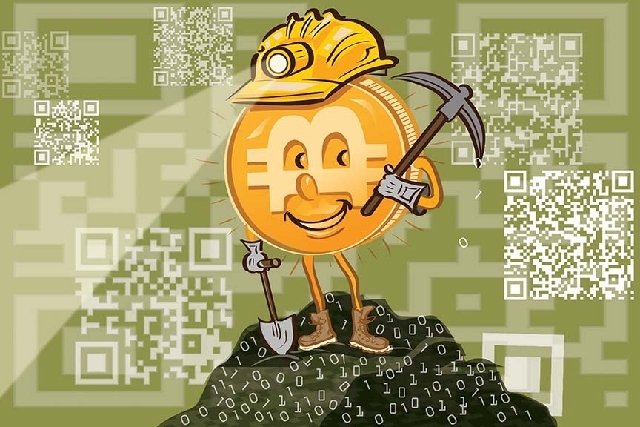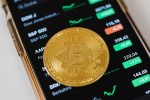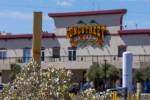With catchy cachet, bitcoins become topic of currency
Bitcoin enthusiasts are talented with similes.
Using bitcoin?
It’s like being an airplane passenger. You don’t have to understand the technology to fly.
Mining bitcoin?
It’s like rolling dice. Eventually you’ll get a winning combination.
Keeping the system honest?
It’s like baseball. If one player calls a foul ball fair, the other players can ignore him.
Enthusiasts rely on comparisons because bitcoin can be a difficult concept to grasp and it is unlike anything non-users have seen.
Bitcoin can’t really be seen: It’s a decentralized digital currency that exists solely online.
Users laud the invisible currency because it’s cryptographically secure, anonymous, doesn’t require bank accounts, can be sent instantly and inexpensively, and is not regulated by any organization or government agency.
Bitcoins don’t belong to any nation and are mathematically immune to inflation.
It’s a currency designed for digital, created in 2009 but only now starting to gain mainstream attention.
LESSON, THEN OBSESSION
Julian Tosh, a Las Vegas man who specializes in Internet security, picked up bitcoins as a way to teach his daughter about money. Then it snowballed into a small obsession.
Tosh said he became seriously interested when a friend couldn’t make rent and asked to borrow bitcoins. Rather than having to meet his friend in person or transfer the money through a bank or wire service, Tosh was able to send it instantly through a smartphone application.
The transaction helped him realize that bitcoin had a serious, real-world application.
While visual representations that look like coins do exist, they’re not necessary to complete bitcoin transactions. The coins aren’t worth set amounts and are seldom physically traded. Identical bitcoin representations can hold different values, and the metal coins themselves are costly, ranging from $10 to $340 on eBay.
Instead, coins and cards are collected or used for personal bitcoin storage.
Live bitcoin transactions are made by sending funds between digital wallets. Users use real money to buy bitcoin through exchange websites such as Mt.Gox and Coinbase, or from companies like BitInstant, which allow users to trade in cash at Wal-Mart, CVS and other stores.
Users sign into a bitcoin client website or mobile app. Scanning a quick response, or QR, code directs the sender to the recipient’s account. The QR code is shortcut to a bitcoin address, a combination of 30-plus numbers and letters, both uppercase and lowercase. It’s possible to type a bitcoin address by hand, but because bitcoin transactions are irreversible, it’s important to get the address right.
Once sent, bitcoin is instantly available, regardless of the distance sent, and is verified within 10 minutes by bitcoin miners.
To dive deeper into the emerging market, Tosh created the website bitcoinsinvegas.com, which links bitcoin users to local merchants who accept the currency. He also picked up mining, which uses specialized hardware to crack randomized codes.
Mining is an essential part of the bitcoin economy; it validates transactions and in doing so, creates new bitcoin. However, creating new bitcoin is not as simple as dreaming up a number and making it a reality. Bitcoins are created at a predictable rate that cannot be manipulated. And the more miners there are, the harder it becomes to earn bitcoin.
Add to that, about every four years, or 210,000 blocks of bitcoin transaction and verification, the reward for mining drops by half. The reward is now set at 25 bitcoin.
Around 2040, when 21 million bitcoin could exist, mining will halt and no new bitcoin will be introduced into the economy. Thus, its backers consider it immune to inflation.
According to Bitcoin Charts, there are 11.4 million bitcoins in circulation now. The value fluctuates, but as of this writing, one bitcoin is valued at about $96.
LOCAL USES
In Las Vegas, bitcoin is accepted by a dozen businesses, ranging from restaurants to mechanic shops to property rental managers and even a dentist.
Each week, Tosh and a handful of other bitcoin believers rally at a new lunch spot and try to persuade the business to accept bitcoins.
If the restaurant owner is skeptical, Tosh will set up a bitcoin tip jar, where users can try the technology risk-free.
Customers can send bitcoin tips to the restaurant through a personalized QR code displayed near the cash register. Tosh will cash them out and return with their earnings.
Bitcoin-friendly business owners say transactions are uncommon.
However, that doesn’t discourage them from accepting it.
Carl Roberson, owner of Carl’s Cool Cars, said that so far only Tosh has paid in bitcoin, but he likes the transactions because they don’t involve credit card fees.
“I haven’t given it the dedication it really deserves,” Roberson said, “but I really like the idea of it.”
Norm Cutter, manager of Budget Dental, where his wife is a dentist, said he’s had two, maybe three customers pay in bitcoin, netting about $200.
He learned about bitcoin through video gaming, and also heard that people in Cyprus were investing in bitcoins to keep their money safe during the financial crisis there.
Cutter said he was more excited about bitcoin earlier this year, before he heard officials in California frown on it.
In May, the California Department of Financial Institutions sent a cease-and-desist letter to the Bitcoin Foundation in Seattle, claiming it was operating a “money transmission business” without a license.
Bitcoin Foundation responded by saying it doesn’t operate in California and is therefore not under the state’s jurisdiction.
Cutter still keeps a sticker on the door of Budget Dental and a logo in his pamphlet.
“Basically no one uses them, but it’s a topic of conversation,” Cutter said.
Haeran and Martin Dempsey, who own a real estate and property management company, are listed on bitcoinsinvegas.com, but haven’t yet been paid in bitcoins.
Martin Dempsey said he uses bitcoins often in online poker transactions. They’re particularly useful, he said, when sending money across borders.
He gives the example of sending a check to Canada and having to pay a fee for more than the check’s value.
Dempsey recently used bitcoins to send money to his daughters while they were traveling. In Malaysia, his older daughter met a man at Starbucks who handed her local currency after he received bitcoin from her parents. In Spain, his other daughter traded bitcoin for an ATM card loaded with euros.
Dempsey said he didn’t worry about his daughters being ripped off by strangers.
“There’s always some amount of risk,” Dempsey said. “Just like eBay has seller ratings, websites like localbitcoins.com rate bitcoin users. Both of these guys had a reputation, and had done it before.”
CONCERNS AND SKEPTICISM
Robert Lind, a licensed broker-dealer with Berkshire Bridge Capital LLC, said Congress has concerns about bitcoin, primarily its use in laundering money. Banks have to know the source of the money they accept, but bitcoin is less traceable, he said.
“Since you don’t know where the currency is coming from, it can be used for a lot of illicit transactions,” Lind said, noting that bitcoins have been used to buy drugs and firearms.
Anonymity, he said, appeals to people seeking private transactions, not all of whom are bad guys.
All bitcoin transactions are recorded in a public ledger, which can be viewed on the Block Chain website. Amounts and accounts are visible, though account owners are anonymous.
Lind said it’s an interesting topic, but he thinks most investment advisers licensed by the Securities and Exchange Commission will stay away from it until it becomes regulated.
Cameron and Tyler Winklevoss, best known for their role in creating Facebook, are trying to do just that, and hope to bring bitcoin into the investing mainstream.
This month, the twins founded the Winklevoss Bitcoin Trust, a new exchange-traded product awaiting SEC review.
If approved, investors will be able to trade bitcoin like stock.
If Tosh, the Winklevosses and other enthusiasts get their wish, it will flourish.
Tosh said he hopes bitcoins ultimately will be adopted as a world reserve currency. “That’s a pie-in-the-sky utopian dream,” he said.
Contact Review-Journal Kristy Totten at
KTotten@Reviewjournal.com




























